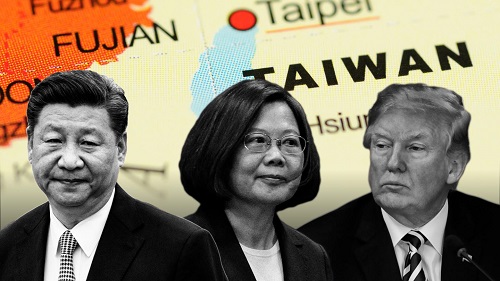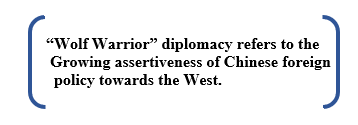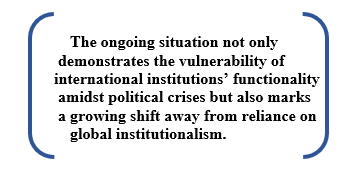Hariharan Chandrashekaran, Research Intern, ICS

COVID-19 has catastrophically emerged as one of the deadliest pandemics of the modern era, reshaping the dynamics of Cross-Strait relations, which has been characterized by limited contact, tensions, and instability. Although China managed to contain the virus, it was accused of a lack of transparency in communication. Meanwhile, Taiwan, with its proximity to China and an ideal destination for mainland tourists, was expected to have the second-highest number of imported cases during the initial stages of the outbreak. However, it was lauded globally for its swift execution of control, propagating the region’s perception in a positive light. Amid all the chaos globally, the World Health Organization (WHO) endured flak from critics for its approach towards the crisis and alleged remarks of being sympathetic towards the Chinese cause.
COVID-19, China, and the WHO.
Not ceding to a “Chernobyl moment”, after a prolonged period China successfully flattened the curve by effectively mobilizing its resources. It has since picked up the mantle to quickly restore its image through soft power measures such as formally dispatching medical equipment, ventilators and face masks to European nations such as Italy, Spain and other crisis-hit countries; now termed as “Mask Diplomacy”. Also, it maintained communication with the WHO, providing updates of the virus and its transmission, contrary to the criticisms.
With early reactions being mainly positive from resource-strapped countries, including its African allies, a discriminatory racial incident within the Chinese mainland against African ethnicity hindered its progress. Additionally, claims of faulty equipment and its return questioned the candour of such measures.

Nevertheless, at the 2020 World Health Assembly (WHA), China pledged to contribute $2 billion to aid the WHO response towards the pandemic and the socio-economic development of the crisis-hit countries, especially Africa. Additionally, it called for global solidarity and collective mobilization of efforts against the virus by supporting WHO. But, mounting criticism resulted in the parallel emergence of the “Wolf Warrior” diplomacy.
“Wolf Warrior” diplomacy refers to the growing assertiveness of Chinese foreign policy towards the West. COVID-19 has only amplified direct engagement of China through a battle of narratives against its critics, chiefly the US, condemning it for politicizing the issue. This development marked the Chinese contribution to the gradual shift of discourse from global institutionalism to hypernationalism. This new direction aims to portray China’s story – a country, attempting to “rise to the challenges of global leadership” by striving in a climate of declining multilateralism.
The Taiwan Cause
Harnessing its experience from the SARS outbreak, the Taiwanese government reacted quickly by entering a strict lockdown mode and enforcing stringent policy measures, gaining universal acclaim. Its technological capabilities tracked down the source of the virus within its area; additionally, it developed a range of testing kits to hasten the process of the containment of the virus. Taiwan succeeded in flattening the curve, showcasing a rare, strong well-executed response, even by WHO standards.
Furthermore, Taiwan took a page out of China’s policy of engagement by initiating its version of ‘Mask Diplomacy’. It was achieved by supplying masks (Taiwan is the second-largest producer of masks after China) and providing technological action frameworks to the affected countries, especially Western powers, thereby, emulating its ability to compensate the lack of its economic power. It had significant implications on its bilateral relations through further cooperation such as ongoing Taiwan – Danish cooperation to develop vaccines and the US amending its position by supporting Taiwan’s membership to the WHA, significantly denting the “One China” policy.
However, its achievements were unacknowledged categorically due to the politics of the WHA, which recognizes the region as part of China, leading former’s exclusion from WHO meetings. It resulted in the emergence of pent up anger amongst the nationalist groups who sought to move away from the Chinese identity. However, the government response was limited to castigating WHO by questioning its non-political nature.

Balance of Tide
It was due to the Taiwanese cause for representation after a prolonged struggle that it finally received the observer status invite to WHA in 2008 Taipei’s observer status at the WHA exemplified a historic shift in Cross-Strait relations. Nevertheless, the Assembly revoked its membership since 2016, owing to the UN Stance on “One China” Policy. Since then, China has actively blocked the prospect, thereby resulting in the reversal of whatsoever gains for positive relations over the years.
In addition to actively blocking Taiwan’s membership bid since 2016, it was also a timeline of heated economic quarrels between the US and China. Also, the Hong Kong protests had a profound impact on Taiwan by significantly affecting the results of the Taiwan presidential and legislative elections in early 2020 favouring the incumbent party and raising its image as a democratic nation. The evolved imagery and the simultaneous allegations on China over lack of transparency immensely accelerated the US legislation of TAIPEI Act – 2019 to make it US policy to advocate Taiwan’s participation in international organizations. However, it was strongly rebutted by China who described it as an “act of hegemony”.
Nevertheless, the battle of narratives between the US and China resulted in the former halting the financing WHO. Complementing it was the announcement of US terminating its relationship with WHO as an attempt to pacify its populace for its lack of preparedness. Moreover, Australia demanded an independent assessment of the performance of the WHO and China in handling the crisis. Both responses drew sharp criticism and rebuttal from China. Nevertheless, moderates such as Germany and France urged transparency for the global good, resulting in China ceding to the demand for investigations, albeit post-crisis, making WHO a battleground of politics.
Conclusion
In tracing the dynamics of Cross-Strait relations, the ongoing
situation not only demonstrates the vulnerability of international institutions’
functionality amidst political crises but also marks a growing shift away from
reliance on global institutionalism. However, for Taiwan, this development brought
a temporary rejuvenated hope for the government to maintain its independent
co-existential nature. In contrast, with China sticking to the “One China”
policy, it expects other countries to reciprocate its policy of
non-interference[*]. However,
the pandemic has catalyzed its assertiveness as evident in the central
leadership’s decision to enforce the “New National Security Law” in Hong Kong,
creating similar potential implications for Taiwan’s cause foregrounding resistance
from the US. To conclude, Beijing has exploited the shift by stressing
cooperation over isolation under the umbrella of the WHO by providing a
differing perspective of multilateralism with Chinese characteristics that calls
for solidarity without interference – a perspective steered by the rising
nationalistic Wolf Warrior diplomacy.
[*]This policy of non-interference is in direct contrast to the U.S. foreign policy of selective international engagement that interferes with domestic issues.